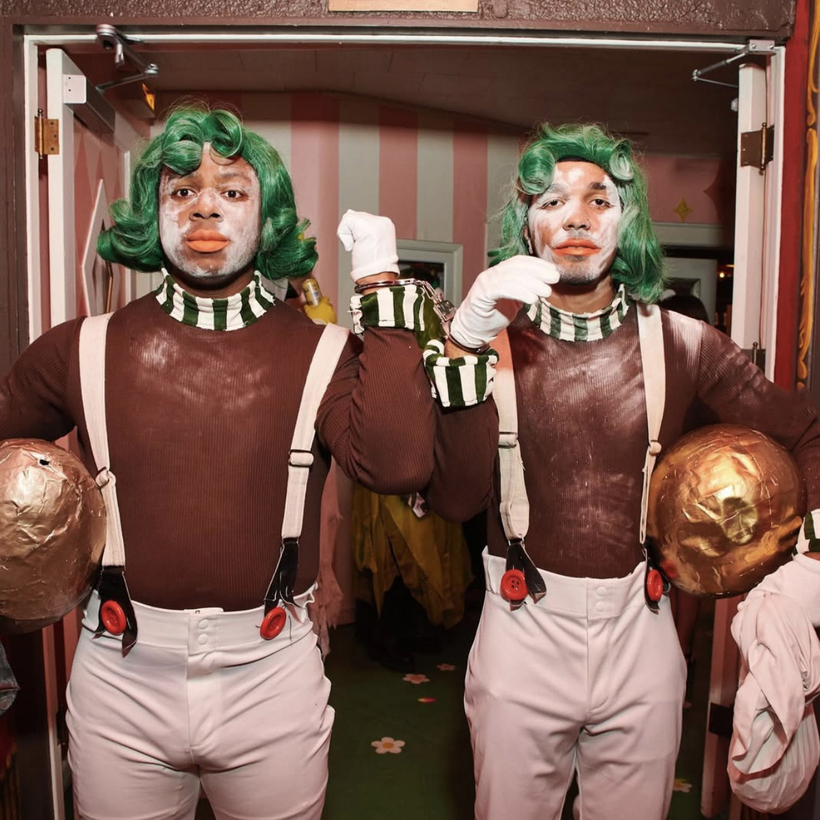I found my seat in the back row at Playspace—in the Skunk Room in Los Angeles’s Elysian Theater, as Zachary Steel, a clown teacher, led a workshop where both seasoned performers and complete newcomers test out short clowning exercises before an audience. About 50 people filled the garage-like space.
“Something about the clown is that they are a skinless grape,” Steel said to us. “They are sensitive people. They can’t hold back from oozing emotional juice all over the room. They are susceptible to personal bigness.”
Over the next two hours, performers leaned into that metaphor—coming up with songs on the spot, cornering audience members, and reacting to heckling. In the modern clown world, booing can be supportive—calling someone a “stupid fucking idiot” can be a compliment. In response, clowns onstage shout, exclaim, and, yes, exude personal bigness.
This ancient comedy form, with roots in many cultures, has recently experienced a renaissance in Los Angeles’s underground comedy scene. This isn’t the red-nosed Bozo variety of 1950s television, nor the artistry of the French performer Marcel Marceau, but rather an electrifying live-theater style built on physical comedy, spontaneity, and heightened audience interaction.

What differentiates clowning from other comedy forms, such as improv or sketch, is that the clown discards the fourth wall. “While improv can be silly and fun, clowning ratchets it up twentyfold,” Chad Damiani, one of the leading figures of L.A.’s clown movement, says. “We are chasing the dumbest ideas, trying to get the audience into a primal state of play.”
“Signing up for a clown class with a two and four year old at home felt like an act of rebellious self care,” one fan, Casey Gates Frey, wrote on her Substack, Lady Brain, last month.
Clowning gained momentum in the mid-2010s at the Lyric Hyperion theater, in Silver Lake, where a small circle of performers—led by the comedy writer Phil Burgers, or “Dr. Brown,” who taught under the ethos of “fail and experiment freely”—formed the backbone of L.A.’s clown scene. During the pandemic, it spilled outdoors with wild, open-air shows at the Old Zoo, in Griffith Park, drawing wider attention. The turning point came in 2021, when the scene relocated to the Elysian Theater—now the city’s go-to venue for genre-blurring performance—igniting a surge of interest.

In an era when brands and individuals curate every move for algorithm-driven feeds, clowning has emerged as an authentic and raw art form in diametrical opposition to pre-packaged neatness. “There’s that originality, vulnerability, and audacity, which is what people are looking for,” DeShawn Ball, a resident clown at the Elysian Theater, says. “Acting and improv have too much of a structure, and clown is making fun of that structure.”
“We were making work that didn’t follow the rules, and it was truly an expression of freedom and chaos and connection,” Damiani says. “We didn’t replace anything. We just added on.”
Over the years, many different types of clowns have developed. Natasha Mercado, who puts together a series of “soft clown” workshops, is a “sensitive elder” in a scene that isn’t always tender. Meanwhile, Ball and Jamonte Williams call themselves Clowns of Color and explore vulnerability and nuance in Black identity.

These days, the Elysian Theater hosts multiple clown shows per week, but clowning is fast expanding beyond the stage. One of L.A.’s biggest clowns, Natalie Palamides, stars in Nate, now streaming on Netflix—a special in which she plays a hyper-masculine man navigating consent through encounters with audience members. Courtney Pauroso’s sex-robot show, Vanessa 5000, where she stages “demonstrations” to squirm-in-your-seat effect, is available on Dropout TV.
While clowns have become known partly for their shock factor, the most successful shows also have a certain earnestness to them. The solemn question of consent in Nate, a cover of the Radiohead classic “Fake Plastic Trees” in Vanessa 5000, and Shylock’s monologue from Shakespeare’s The Merchant of Venice in Eli Leonard’s Good Showbiz all reveal a sincerity that underpins clowning’s exploration of the human condition.

“All clowns deal with the audience,” Pauroso says, “but there’s a really radical presence here that’s immersive and communal.” She says that true discovery happens in “the flop,” a clowning term that describes failure in front of an audience. “When you’re really suffering and failing, you’re close to gold—you reach a point where you don’t give a fuck anymore, and it’s so powerful.”
Last month, I caught an open dress rehearsal for Good Showbiz. Leonard plays the character Sandy Synagoguenstein as he takes us through a history of Jewish theater. He tips participants in $1 bills for their willingness to come onstage, asking audience members to hold cue cards for him or zap him with a dog collar while he performs the bottle dance from Fiddler on the Roof.

In speaking to a number of clowns, it was repeatedly emphasized to me that the whole point of clown shows is to fly in the face of the mainstream and revel in this sort of stupidity—clowning is “subversive,” clowning is “rock ’n’ roll.”
“Clown is counterculture, and if it were ever to become culture, that would require a level of assimilation and simplification that would become something else,” Damiani says. “People will graduate to different levels of success, but the charm of clowning is that it’s unwieldy and unpredictable and not for everyone.”
For now, clown shows can be caught at fringe festivals and independent theaters in the U.S. But for those located in Los Angeles or New York City, they’re much more accessible than you think. Give yourself over; volunteer to squirm in discomfort onstage. Be a skinless grape. Don’t be a “stupid fucking idiot”—or do.
Lynn Q. Yu is an Editor at Large at AIR MAIL


